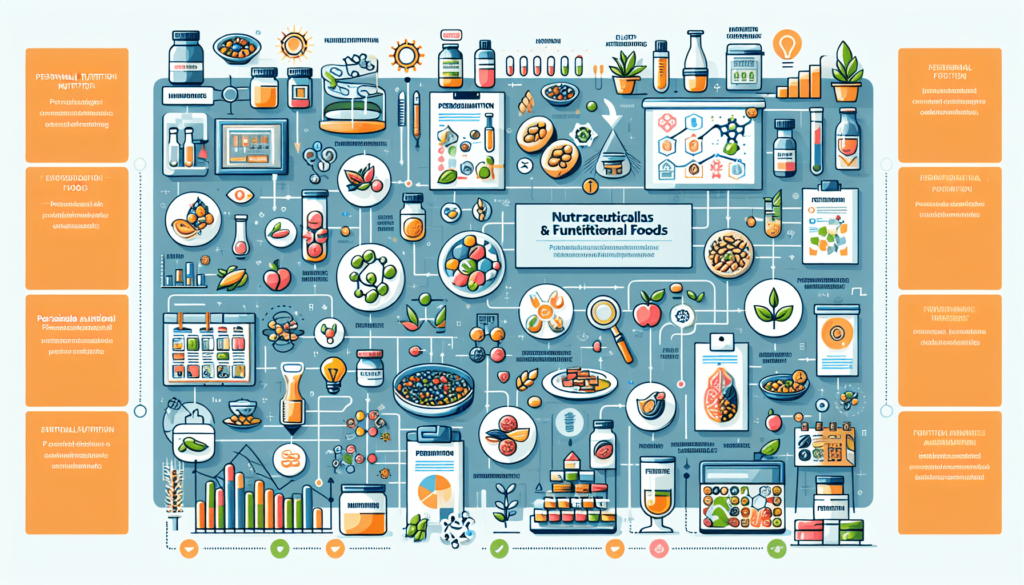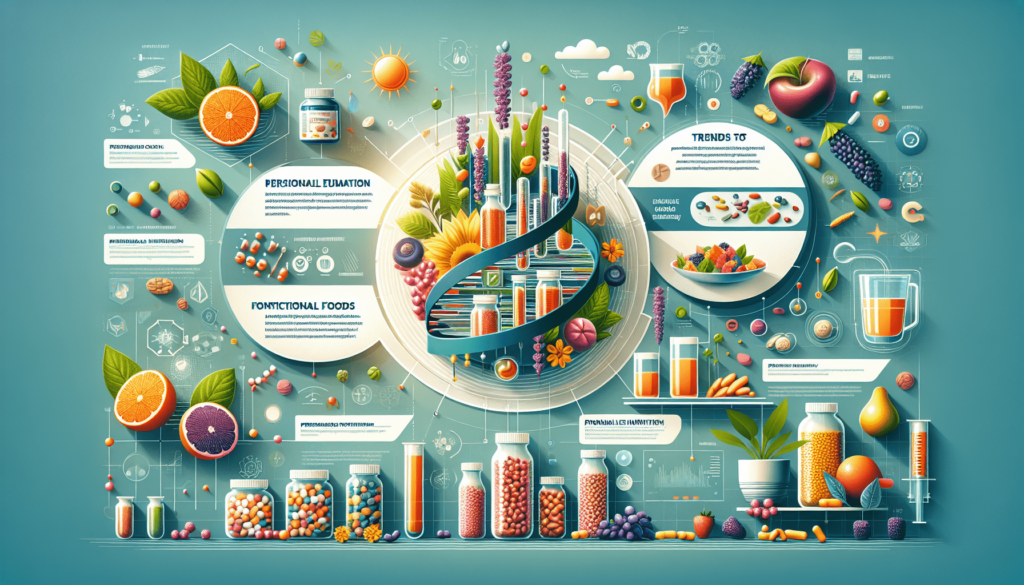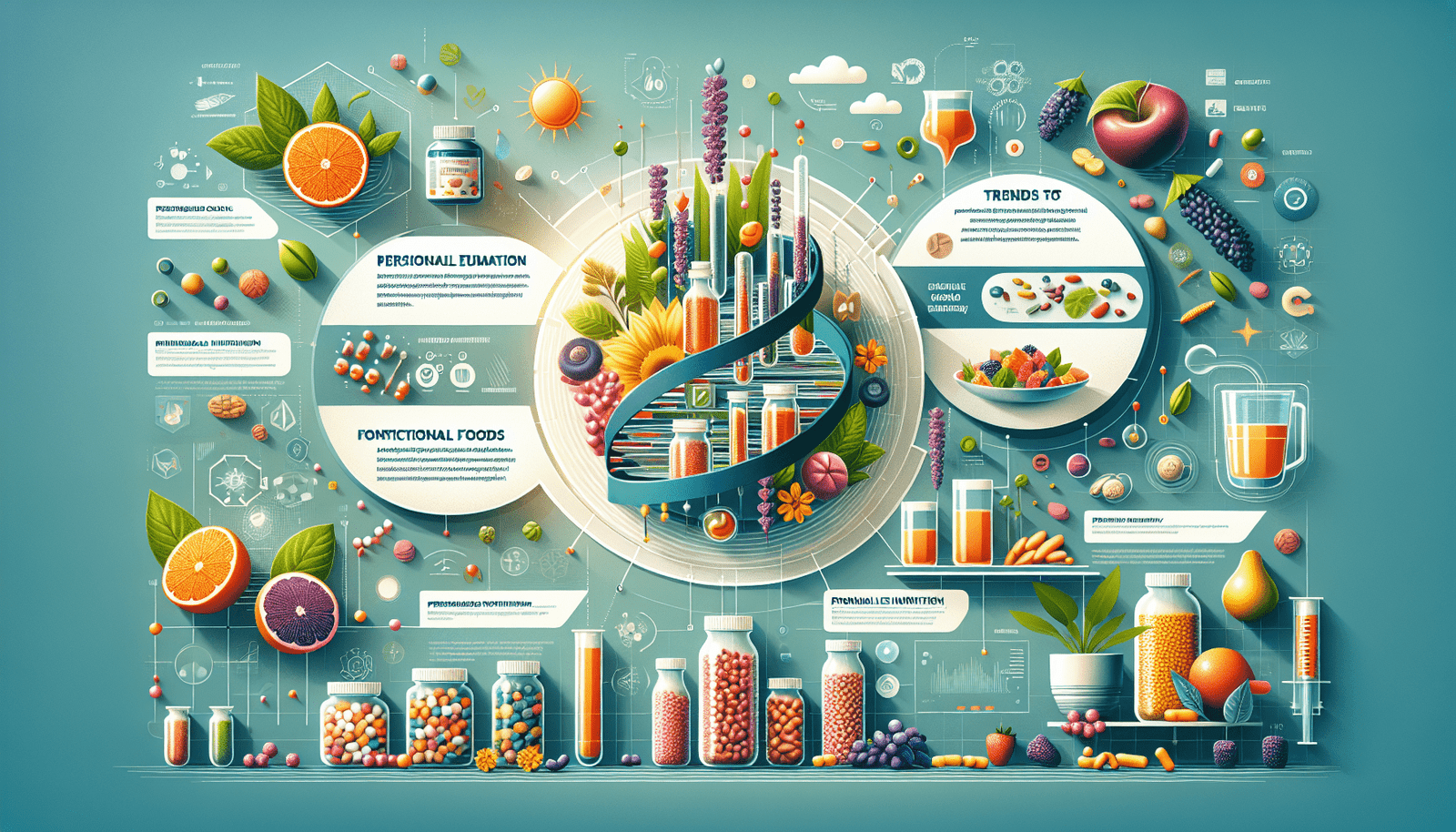In the world of nutrition and health, staying up-to-date on the latest trends in nutraceuticals and functional foods is key. From superfoods to personalized diets, there is a constant stream of innovative products and practices emerging. With an increasing focus on holistic wellness and preventive healthcare, this article explores the fascinating realm of nutraceuticals and functional foods, shedding light on the latest trends that can enhance your overall well-being. Whether you’re curious about the rise of plant-based proteins or the health benefits of adaptogens, this article will provide insightful information to guide you on your journey towards a healthier lifestyle.

Plant-based proteins
Increasing demand for plant-based protein sources
In recent years, there has been a significant increase in the demand for plant-based protein sources. People are becoming more conscious of their dietary choices and are opting for plant-based proteins as a healthier and more sustainable alternative to animal products. Plant-based proteins are not only rich in essential amino acids but are also low in saturated fats and cholesterol, making them an excellent option for individuals looking to maintain a balanced diet. Additionally, plant-based proteins have a lower environmental impact compared to traditional animal-based proteins, making them a more sustainable choice for our planet.
Innovative plant-based protein products
Food manufacturers and startups have recognized the growing demand for plant-based proteins and have been developing innovative and delicious alternatives to traditional meat and dairy products. These products include plant-based burgers, sausages, and even dairy-free milk alternatives. Using ingredients such as soy, peas, beans, and nuts, these plant-based protein products not only provide the necessary protein but also mimic the taste and texture of their animal-based counterparts. This innovation in plant-based protein products has made it easier than ever for individuals to incorporate more plant-based proteins into their diets without sacrificing the taste or texture they are accustomed to.
Protein-rich foods from legumes and beans
Legumes and beans, such as lentils, chickpeas, and black beans, have long been known as excellent sources of protein. They are not only rich in protein but also packed with essential nutrients such as fiber, vitamins, and minerals. These protein-rich foods are versatile and can be incorporated into a variety of dishes, such as stews, salads, and soups. In addition to being nutritious, legumes and beans are also affordable and readily available, making them an accessible choice for individuals looking to increase their protein intake. By incorporating more legumes and beans into your diet, you can enjoy a wide range of health benefits while also supporting sustainable and eco-friendly food choices.
Functional beverages
Rise in popularity of functional beverages
Functional beverages, also known as functional drinks or enhanced beverages, have gained significant popularity in recent years. These beverages are formulated to provide specific health benefits beyond basic hydration. From energy drinks to detox tonics, functional beverages are designed to target and improve various aspects of health and well-being. With busy lifestyles and increasing awareness of the importance of nutrition, more and more people are turning to functional beverages as a convenient and effective way to supplement their diets and support their overall health goals.
Functional drinks with added vitamins and minerals
One of the key features of functional beverages is their inclusion of added vitamins and minerals. Many functional drinks are fortified with essential vitamins, such as vitamin C, vitamin D, and B vitamins, as well as minerals like calcium and magnesium. These added nutrients provide an extra boost to the body’s daily requirements and are easily absorbed when consumed in liquid form. Whether it’s a vitamin-infused water or a nutrient-packed smoothie, functional drinks offer a convenient and delicious way to ensure you are meeting your daily nutritional needs.
Adaptogenic beverages for stress relief
Stress is a common part of modern life, and many individuals are turning to adaptogenic beverages for stress relief. Adaptogens are a class of herbs and botanicals that help the body adapt to and manage stress more effectively. These adaptogenic herbs, such as ashwagandha, rhodiola, and holy basil, are often blended into functional beverages to provide a natural and holistic approach to stress management. By incorporating adaptogenic beverages into your daily routine, you can support your body’s resilience to stress and promote overall well-being.
Gut health and probiotics
Growing interest in gut health
In recent years, there has been a growing interest in gut health and its impact on overall well-being. The gut microbiome, which is a complex community of bacteria in our digestive system, plays a crucial role in maintaining our health. Research has shown that a healthy gut microbiome is linked to improved digestion, immune function, mental health, and even weight management. As a result, more and more individuals are seeking ways to improve their gut health and are turning to probiotics and fermented foods as natural solutions.
Probiotics for digestive health
Probiotics are live bacteria and yeasts that are beneficial for our gut health when consumed in adequate amounts. These friendly bacteria help restore the natural balance of our gut microbiome and promote better digestion and nutrient absorption. Probiotic-rich foods, such as yogurt, sauerkraut, kimchi, and kefir, are great additions to a healthy diet and can help improve gut health. In addition to consuming probiotic-rich foods, many people also choose to take probiotic supplements to ensure they are getting enough of these beneficial bacteria.
Fermented foods as a source of probiotics
Fermented foods have been a staple in many culinary traditions for centuries and are now gaining recognition for their gut health benefits. Fermentation is a natural process that involves the breakdown of carbohydrates by bacteria and yeast. This process not only enhances the flavor and texture of foods but also promotes the growth of beneficial bacteria, resulting in a probiotic-rich product. Some popular fermented foods include kombucha, miso, tempeh, and pickles. By incorporating more fermented foods into your diet, you can support a healthy gut microbiome and improve your overall digestive health.

Superfoods and antioxidants
Superfoods gaining popularity
Superfoods have become increasingly popular in recent years due to their high nutritional content and potential health benefits. Superfoods are nutrient-dense foods that are packed with vitamins, minerals, and antioxidants. These foods are often associated with reducing the risk of chronic diseases, improving brain function, boosting energy levels, and promoting overall well-being. Some examples of superfoods include berries, leafy greens, nuts, seeds, and whole grains. By incorporating superfoods into your diet, you can ensure you are getting an abundance of essential nutrients to support your health and vitality.
Functional foods rich in antioxidants
Antioxidants are compounds that help protect our cells from damage caused by free radicals, which are unstable molecules in the body. A diet rich in antioxidants has been linked to a reduced risk of chronic diseases and aging-related health issues. Functional foods that are rich in antioxidants include colorful fruits and vegetables, such as berries, oranges, kale, and spinach. These foods not only provide essential vitamins and minerals but also help fight oxidative stress and inflammation in the body.
Antioxidant-packed fruits and vegetables
Fruits and vegetables are not only excellent sources of essential nutrients but are also packed with antioxidants. Colorful fruits and vegetables, such as blueberries, raspberries, spinach, and broccoli, contain high levels of antioxidants, vitamins, and minerals. By incorporating a variety of antioxidant-rich fruits and vegetables into your diet, you can help reduce the risk of chronic diseases, boost your immune system, and promote overall well-being.
Personalized nutrition
Individualized diets for specific health needs
Personalized nutrition has gained traction as individuals recognize that there is no one-size-fits-all approach to diet and nutrition. Each person has unique dietary requirements based on factors such as age, gender, genetics, and underlying health conditions. Personalized nutrition involves tailoring dietary recommendations to meet these specific needs. By working with healthcare professionals or registered dietitians, individuals can create individualized diets that support their unique health goals and address any nutritional deficiencies or imbalances.
Customized nutrition plans based on genetic profiles
Advancements in genetic testing have opened up new possibilities for personalized nutrition. By analyzing an individual’s genetic profile, healthcare professionals can gain insights into specific dietary needs and optimize their nutrition plans accordingly. For example, genetic testing can reveal if an individual has a higher risk of certain nutrient deficiencies or sensitivities to certain foods. With this information, customized nutrition plans can be created to ensure the individual is getting the right balance of nutrients and avoiding potential allergens or irritants.
Apps and technology for personalized nutrition
The rise of smartphone applications and technological advancements has also led to the development of personalized nutrition tools. These apps and platforms use algorithms and data analysis to provide personalized dietary recommendations based on individual preferences, goals, and health parameters. By tracking food intake, activity levels, and health metrics, individuals can receive real-time feedback and personalized guidance to help them make healthier choices. Whether it’s tracking macronutrient intake, monitoring hydration levels, or receiving recipe suggestions, personalized nutrition apps and technology offer convenient and accessible ways to optimize your diet and lifestyle.
Clean labels and transparency
Consumers demand for clean and transparent product labeling
Today’s consumers are increasingly aware of the importance of knowing exactly what is in the food and products they consume. There is a growing demand for clean and transparent product labeling, with consumers seeking clear and accurate information about the ingredients, sourcing, and production methods used. Clean labeling refers to the use of simple, recognizable ingredients and the avoidance of artificial additives, preservatives, and unnecessary fillers. By demanding clean labels, consumers are advocating for more sustainable, wholesome, and transparent food choices.
Functional foods with no artificial additives or preservatives
Functional foods are now being formulated with a focus on using natural, high-quality ingredients and avoiding artificial additives or preservatives. This shift in the industry is driven by consumer demand for cleaner and healthier food options. Functional foods without artificial additives or preservatives offer a more wholesome and natural alternative to conventional processed foods. These clean-label functional foods provide the desired health benefits without compromising on quality or taste.
Clear information on sourcing and production
In addition to clean and transparent labeling, consumers are also seeking clear information on the sourcing and production methods used in the creation of functional foods. There is a growing interest in supporting sustainable, ethical, and environmentally conscious practices. Consumers want to know where their food comes from, how it was grown or produced, and whether it aligns with their values. By providing clear and transparent information on sourcing and production, functional food companies can build trust with consumers and meet their expectations for responsible and ethical food choices.
Digestive enzymes and dietary fibers
Importance of digestive enzymes for nutrient absorption
Digestive enzymes play a crucial role in breaking down food into smaller molecules that can be absorbed by the body. These enzymes help facilitate the digestion and absorption of nutrients, ensuring that our bodies can effectively utilize the essential vitamins, minerals, and macronutrients present in our food. However, factors such as poor diet, stress, aging, and certain health conditions can lead to enzyme deficiencies. Supplementing with digestive enzymes can help support healthy digestion and optimize nutrient absorption.
Functional foods with added digestive enzymes
To support optimal digestion, many functional foods are now being formulated with added digestive enzymes. These foods, such as yogurt, kombucha, and certain protein bars, contain specific enzymes that help break down proteins, carbohydrates, and fats, enhancing their digestion and absorption. By consuming functional foods with added digestive enzymes, you can support your body’s natural digestive processes and ensure the efficient absorption and utilization of nutrients.
Increased intake of dietary fiber for improved digestion
Dietary fiber is a type of carbohydrate that cannot be broken down by the body. However, it plays a crucial role in supporting digestive health. Fiber adds bulk to the stool, promotes regular bowel movements, and supports a healthy gut microbiome. It can also help regulate blood sugar levels, lower cholesterol, and promote a feeling of fullness, which can aid in weight management. Functional foods rich in dietary fiber, such as whole grains, fruits, vegetables, and legumes, should be incorporated into a balanced diet to support optimal digestion and overall health.
Cognitive and brain health
Growing interest in cognitive and brain health
With an aging population and an increased focus on overall well-being, there is a growing interest in cognitive and brain health. People are searching for ways to support cognitive function, improve memory, and enhance focus and concentration. The brain is a complex organ that requires specific nutrients for optimal function. By adopting a brain-healthy diet and lifestyle, individuals can support cognitive health and reduce the risk of age-related cognitive decline.
Functional foods with brain-boosting ingredients
Certain functional foods are known to contain brain-boosting ingredients that support cognitive function. These foods include fatty fish rich in omega-3 fatty acids, nuts and seeds containing antioxidants and omega-3s, berries with powerful antioxidants, and dark chocolate rich in flavonoids. By incorporating these brain-boosting foods into your diet, you can provide your brain with essential nutrients that support its optimal function and promote cognitive health.
Nutritional supplements for memory and focus
In addition to a brain-healthy diet, nutritional supplements are becoming increasingly popular for supporting memory and focus. Supplements such as omega-3 fatty acids, Ginkgo biloba, Bacopa monnieri, and vitamins B6 and B12 have been studied for their potential cognitive benefits. While it’s important to consult with a healthcare professional before starting any supplementation regimen, incorporating these supplements into a balanced diet may help support memory, focus, and overall cognitive health.
Sustainable and eco-friendly products
Rise in demand for sustainable nutraceutical products
As sustainability and environmental conservation become global priorities, there is a rising demand for sustainable nutraceutical products. Consumers are seeking products that not only support their health and well-being but also minimize their impact on the environment. Sustainable nutraceutical products are those that are responsibly sourced, produced using eco-friendly practices, and packaged in materials that have minimal environmental impact. By choosing sustainable options, individuals can make a positive impact on their own health as well as the health of the planet.
Eco-friendly packaging and production methods
One aspect of sustainable nutraceutical products is the use of eco-friendly packaging and production methods. More and more companies are adopting sustainable packaging solutions such as biodegradable or compostable materials, recycled packaging, and minimalistic designs that reduce waste. Additionally, eco-friendly production methods prioritize energy efficiency, waste reduction, and the use of renewable resources. By supporting companies that prioritize sustainable packaging and production, individuals can contribute to reducing their carbon footprint and promoting a healthier planet.
Functional foods with minimal environmental impact
Sustainable nutraceutical products also consider the environmental impact of the ingredients used. Functional foods that are sourced from organic farming, regenerative agriculture, or sustainable fishing practices help preserve the health of our ecosystems. By choosing functional foods that have a minimal environmental impact, individuals can support practices that are both beneficial for their health and sustainable for the planet.
Immune system support
Importance of immune system health
A strong immune system is essential for protecting the body against harmful pathogens and maintaining overall health and well-being. The immune system is responsible for identifying and fighting off foreign invaders, such as bacteria, viruses, and parasites. Adequate nutrition and a healthy lifestyle play a critical role in supporting immune system health. Individuals are increasingly recognizing the significance of immune system support and are seeking functional foods and supplements to boost their body’s natural defense mechanisms.
Functional foods with immune-boosting ingredients
Certain functional foods contain immune-boosting ingredients that help strengthen the immune system. These foods include citrus fruits rich in vitamin C, garlic with antimicrobial properties, ginger with anti-inflammatory effects, and turmeric with its immune-modulating properties. By incorporating immune-boosting functional foods into your diet, you can provide your body with the necessary nutrients to enhance your immune system function and protect against infections and illnesses.
Natural remedies for immune support
In addition to functional foods, natural remedies have long been used to support immune system health. Herbal remedies such as echinacea, elderberry, and astragalus have been traditionally used for their immune-boosting properties. These natural remedies are now available in various forms, including teas, extracts, and supplements. While it’s important to consult with a healthcare professional before using any new remedies, incorporating natural immune-supportive remedies into your health routine may help bolster your body’s natural defenses and promote overall immune system health.
As the field of nutraceuticals and functional foods continues to evolve, it is important for individuals to stay informed and empowered to make informed choices about their health and well-being. By understanding the latest trends and incorporating these topics into your lifestyle, you can support your overall health and optimize your well-being. Whether it’s choosing plant-based proteins, exploring functional beverages, prioritizing gut health, embracing superfoods and antioxidants, personalizing your nutrition, advocating for clean labels and transparency, supporting digestion, caring for cognitive health, opting for sustainable products, or boosting your immune system, there are numerous pathways to a healthier lifestyle. Each individual has their own unique journey, and by paying attention to these trends and taking steps towards a more well-rounded and mindful approach, you can embark on your own path to better health and vitality.
